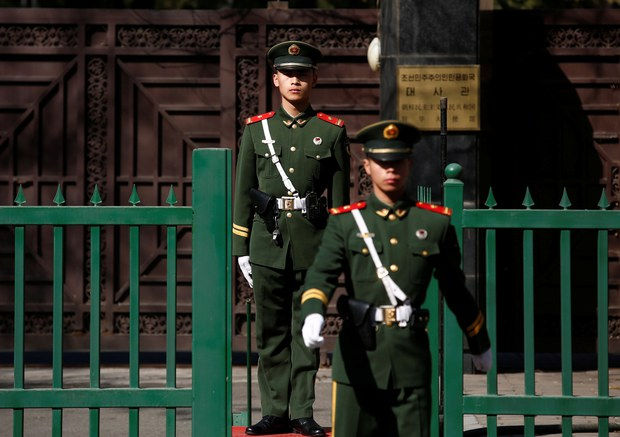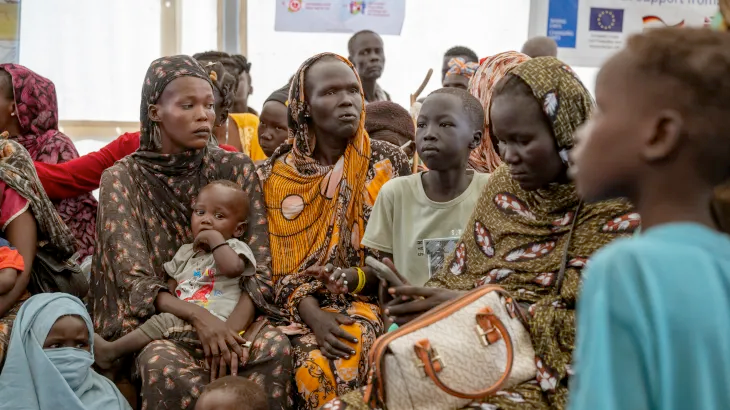Arrests of North Korean Refugees Continue In China
- !a Radio Free Asia 1

- Aug 21, 2021
- 4 min read
Jeong Yon Park for RFA’s Korean Service. Translated by Leejin Jun. Written in English by Eugene Whong.
Radio Free Asia
August 20, 2021
A woman who fled the North more than 10 years ago was dragged away from her Chinese husband and their child.

Chinese paramilitary policemen guard the gate of the North Korean embassy in Beijing, China, March 8, 2017. Reuters.
A spate of arrests of North Korean wives of Chinese men—raids seizing long-time residents in front of their families—has the put the refugee community in northeastern China on edge, sources in China told RFA.
The latest in periodic crackdowns on North Koreans living illegally in China has seen arrests and threatened deportations in Liaoning and Jilin, the two provinces on China’s side of their 840-mile (1,350 km) shared border, the sources said.
Hundreds of thousands of North Koreans fled to China to escape a mid-1990s famine, with about 30,000 making their way to South Korea. As many as 60,000 North Koreans remain China, despite having no legal status, and some have married Chinese nationals.
After a long period of time in which the North Korean spouses of Chinese nationals were treated leniently, despite Beijing’s commitment with Pyongyang to repatriate all illegal North Koreans found within its borders, police are now actively arresting them.
“Police officers suddenly stormed the house of a North Korean woman in her late 30s, arrested her and took her to prison,” a Chinese citizen of Korean descent from Tonghua city in Jilin province told RFA’s Korean Service.
“After she escaped from North Korea, she got married and has been living in Tonghua for 10 years. She has a small child. Everyone in the neighborhood knew she was a refugee, but she was never reported or arrested,” said the source, who requested anonymity for security reasons.
The source said police took the woman away in late July on human trafficking charges.
“She was well known for providing food and clothing to North Koreans who had just crossed over the border. She helped provide them with shelter and jobs,” said the source.
“She is a kind-hearted person who helps everyone in the neighborhood, not only refugees, so the neighbors are very saddened by the news of her arrest,” the source said.
Trafficking of newly escaped North Korean women in China is a deep-rooted industry as traffickers capitalize on their desperation.
A 2018 report by the Seoul-based Korean Institute of Criminology and Justice (KICJ) estimated that 80 percent of female North Korean refugees in China “are entrapped in a form of trafficking- commercial sex, forced labor, and forced marriages.”
But China has often laid human trafficking charges on aid workers or others who help North Korean refugees, and people in the Tonghua community did not believe that the human trafficking charge should apply to the North Korean woman or her husband, the Jilin province source said.
“She escaped a hard life in North Korea and she supported other North Korean refugees both physically and emotionally while they were in such a difficult situation,” the source said.
“She has a nine-year-old child with her Chinese husband, and the child cries every day looking for mom. The neighbors are all petitioning the police to release her, saying that it is so sad to see the child crying,” the source said.
The arrest was one of two in Tonghua last month involving married North Korean women who had escaped to China a long time ago, according to the source.
“Neighbors are strongly criticizing the inhumane treatment of the public security agents, saying, ‘What will happen to the child if they arrest the mother and ruin a family that is living well?’” the source said.
Another Chinese citizen of Korean descent from Shenyang, in Liaoning province, confirmed to RFA that the crackdown on North Korean refugees was in effect there as well.
“It is making the North Koreans tremble with anxiety. Since early July, the public security agents have been raiding their residences, or going to their workplaces to arrest them,” said the second source, who requested anonymity to speak freely.
“In mid-July, a close friend, an ethnic Korean like myself, called me urgently at night to ask for my help, saying he was unable to reach his girlfriend, a North Korean refugee, who works at a restaurant near Shenyang Station,” said the second source.
“Four days later, I was told that the refugee had been receiving treatment at a hospital in the prison for the past three days. She had difficulty breathing and was going into shock while she was being arrested at the restaurant,” the second source said.
While in prison, the woman was able to borrow a mobile phone to secretly call her boyfriend to avoid police detection, according to the second source.
“She said that there were more than 10 North Korean women imprisoned in addition to herself. Just before hanging up, she told my friend it would be difficult to come back if they send her back to North Korea,” the second source said.
“My friend has been living every day in tears for over a month,” added the source.
News of the crackdown in Shenyang is spreading among the refugee community, and even long-timers and their families are afraid, according to the second source.
“In the past, even if the police knew that there were North Korean refugees living in an area, they did not arrest them unless they started causing problems. Now they are actively searching for them and arresting them, so all the North Korean refugees are terrified.”
RFA contacted the Chinese Embassy in the U.S. for comment but the embassy did not respond.
Beijing claims it must return North Koreans found to be illegally within Chinese territory under two agreements it has signed with Pyongyang, the 1960 PRC-DPRK Escaped Criminals Reciprocal Extradition Treaty and the 1986 Mutual Cooperation Protocol for the Work of Maintaining National Security and Social Order and the Border Areas.
Rights groups, however, say that forced repatriation is a violation of China’s responsibility to protect the escapees under the UN Refugee Convention.
RFA reported last month that China forcibly repatriated 50 North Korean refugees, the first repatriations since the border was closed at the beginning of the coronavirus pandemic in Jan. 2020. The North Koreans were loaded onto buses in the Chinese border city of Dandong and taken across the Yalu River to the North Korean city of Sinuiju.
According to the Department of State’s 2020 Trafficking in Persons Report, there are up to 30,000 unregistered children of North Korean women and Chinese men. The report noted that the children are stateless and vulnerable to exploitation.
2021 Radio Free Asia



